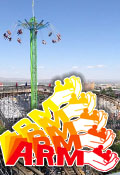Weekend only operation provides challenges
AT: Tim Baldwin
GRAND PRAIRIE, Texas — Ray Bragg, lead supervisor of rides and games at  Traders Village Grand Prairie, got his start as a ride operator at Six Flags Over Texas as a teen in 1967. His career has taken him to multiple venues in the industry — theme parks, water parks, a museum and a flea market. It was also where he met his wife. Spanning half a century, his career has seen the many workings of operations throughout these different properties. Today, he is three-quarters of a year through what he calls semi-retirement in North Texas, an area he considers “home.”
Traders Village Grand Prairie, got his start as a ride operator at Six Flags Over Texas as a teen in 1967. His career has taken him to multiple venues in the industry — theme parks, water parks, a museum and a flea market. It was also where he met his wife. Spanning half a century, his career has seen the many workings of operations throughout these different properties. Today, he is three-quarters of a year through what he calls semi-retirement in North Texas, an area he considers “home.”
Encouraged by longtime friend Jerry Holt, marketing manager, Bragg stepped into his new role at Traders Village.
Open every weekend, Traders Village is one of three such named flea markets in Texas. Each facility has a complement of rides. Shopping tends to be the main attendance driver, but Bragg knows that at some point, most visitors drift over to the rides area. While ride tickets can be purchased individually, an all-day wristband costs only $12.99, so a reasonable and affordable time in the entertainment area is very common.
Weather, like any park, can be a huge factor. On nice days, the market can see more 50,000 people on one day strolling the walkways. With free admission, exact attendance figures are not possible, but Traders Village estimates they do more than three million people a year — all within a two-days-a-week operation. Even on the busiest days, Bragg is proud of how well his ride crews handle the crowds to where lines don’t get too long.
 Having attended the recent AIMS Safety Seminar, Bragg continues to find that most operators confront the same issues. While the safety seminar is geared more toward maintenance, he said there were still takeaways from an operations standpoint.
Having attended the recent AIMS Safety Seminar, Bragg continues to find that most operators confront the same issues. While the safety seminar is geared more toward maintenance, he said there were still takeaways from an operations standpoint.
When asked to come aboard at Traders Village, Bragg said he was impressed at how well the rides had been maintained, the grounds were clean, and he felt the team was very tight.
The facility has gravitated toward American-manufactured rides to have parts easily obtainable. “We pick up the phone, call them and have parts within a couple of days. We try to keep the normal parts on hand. We have not had an issue. It’s helpful to have a good relationship,” said Bragg.
His goal is to have the rides operate at such a quality that they become a bigger and bigger part of the operation. When he finds people coming just for the rides, that pleases him.
With his five decades of experience, Amusement Today asked Bragg to reflect on operations and his current position.
What is the biggest challenge in being open two days a week year round?
Staffing would be the major challenge. I not only have rides to operate, but ticket sales and games. I’m looking at 40 people (using round numbers), and most of those people have other jobs. They work five days a week somewhere else and then come here on Saturday and Sunday. That keeps them very busy. When people do that a while, they need a break, so there is turnover. That leads into constant training. About a third are school age or in college who go to classes during the week and work on the weekends. We have people who are retired and just want to work on the weekends. We have a mixture.
What about maintenance? Is that difficult to find the workers?
Actually, they work several days a week, so that’s different. We’ve got dedicated maintenance people. One is a NAARSO inspector.
Do ride operators receive training on multiple rides?
We want them to have training on several rides. Over time, we want them to have training on everything. They enjoy that, and it keeps their head in the game. It’s good for them and good for us. Larger parks tend to focus on a ride crew that handles a few rides. Smaller parks look at spreading people out more.
Is there any difference in maintaining old rides compared to the new ones?
The maintenance people do a terrific job. Our Allen Herschel helicopter ride was made in 1966. It runs great. As an operator, I can’t say enough about the maintenance team. We try to help them, support them and don’t mind getting under there and working with them. It’s a team.
How have operations changed in the past half century?
At its core, the mission of any operation is basically the same as it has always been: To provide a safe, efficient, clean and entertaining environment for our guests and to provide a level of service and value that bring people back again and again.
The industry has changed in many ways, but two major changes have been in the areas of technology and human resources. The industry has been very good at keeping up with the demand for bigger, better, more thrilling attractions while improving safety and marketability, and I assume it will continue to innovate and grow.
The second major change is in the area of human resources. The demand on our traditional labor pool is growing, resulting in an ever-decreasing number of available applicants. In addition, the mean length of tenure is decreasing. Human resources teams in many parks are quite creative in meeting staffing needs. Frequent turnover, coupled with the continuing focus on improving safety and safety training, results in many operations being in a continuous training cycle with all the certification and documentation requirements that result. Training occupies a significant portion of a management team’s time and energy and rightly so. This is a major change for the time when a new employee was issued an ID and sent to a ride where on-the-job training done by the nearest operator was all that was offered.
Have you had any surprises since coming to Traders Village in comparison to working at more traditional facilities?
I have been happily surprised with the people who work here. I have some people who have been here 25 years — and some have full-time jobs. That speaks toward the commitment. That tells you something about the organization when people commit that chunk of their lives.
How do you estimate the percentage of guests that visit the rides area?
That’s actually one of the programs I’ve initiated — tracking numbers of rides given each day. It’s going up. That’s my goal, I want to see the numbers go up.
What advice would you give a younger operations person just entering the field?
For a new operator just starting in a park, the advice is simple: Relax, work hard, have fun and learn. You have a great opportunity. It is not everyone who has the chance to go to work in a place where the whole purpose is to have fun. You will know quickly if this work environment fits you. If it does, you have found the greatest job you will ever have. The skills you will learn dealing with the public can be applied throughout your life no matter what you do for a living.
From a career manager’s point of view, the opportunity to work with young adults and watch them grow in confidence, ability, and skill, and then watch them succeed is the most rewarding experience I can imagine.
This article appears in the APRIL 2018 issue of Amusement Today.















